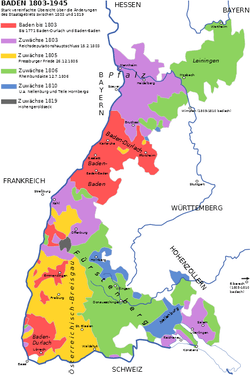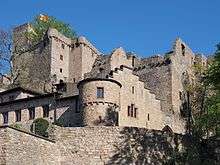Baden
Baden (/ˈbɑːdən/; German: [ˈbaːdn̩]) is a historical territory in South Germany and North Switzerland, on both sides of the Upper Rhine.


History
The margraves of Baden originated from the House of Zähringen.[1] Baden is named after the margraves' residence, Hohenbaden Castle in Baden-Baden. Hermann II of Baden first claimed the title of Margrave of Baden in 1112. A united Margraviate of Baden existed from this time until 1535, when it was split into the two Margraviates of Baden-Durlach and Baden-Baden. Following a devastating fire in Baden-Baden in 1689, the capital was moved to Karlsruhe.
The two parts were reunited in 1771 under Margrave Charles Frederick. The restored Margraviate of Baden was elevated to the status of electorate in 1803. In 1806, the Electorate of Baden, receiving territorial additions, became the Grand Duchy of Baden.
The Grand Duchy of Baden was a state within the German Confederation until 1866 and the German Empire until 1918, succeeded by the Republic of Baden within the Weimar Republic and Nazi Germany. From 1945 to 1952, South Baden and Württemberg-Baden were territories under French and American occupation, respectively. They were united with Württemberg-Hohenzollern to form the modern Federal State of Baden-Württemberg in 1952.
Geography
Baden lies in the southwest of Germany, with most of its major cities on the Upper Rhine Plain. Bounded by Lake Constance on the south and by the river Rhine on the south and west, the region of Baden stretches from the Linzgau, Lörrach and Freiburg im Breisgau to Karlsruhe and then on to Mannheim, leading to the Main and Tauber rivers.
To its west lies the French historical region of Alsace, to its south Switzerland, the Palatinate to its northwest, Hesse to the north, and parts of Bavaria to the northeast. Its eastern border with the region of Württemberg runs from the Kraichgau through the Black Forest, and from some parts of the forest to the Rhine the distances become as low as 18 kilometres (11 mi) in the so-called "Wespentaille" near Gaggenau.
See also
| Wikimedia Commons has media related to Baden. |
| Wikisource has original text related to this article: |
References
- "Baden, historical state, Germany". Encyclopedia Britannica. Retrieved 2018-05-09.
- Baden (D) in German, French and Italian in the online Historical Dictionary of Switzerland.